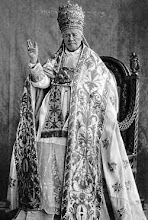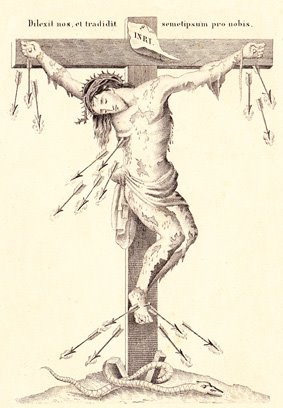
From "The Glories of Mary" by Saint Alphonsus
Our Blessed Lady told Saint Bridget that she was the mother not only of the just and innocent, but also of sinners, provided they were willing to repent. Every sinner who wishes to mend his ways finds this good mother ever so willing to embrace and help him; far more so than any earthly mother. Saint Gregory VII had this thought in mind when he wrote to the Countess Matilda, saying: "Resolve to give up sin, and I promise you that you will find Mary more ready to love you than any earthly mother."
But whoever hopes to be a child of this great mother must first abandon sin. Only then can he hope to be accepted as Mary's son. Richard of Saint Lawrence, commenting on the words of Proverbs: "Her children rise up and praise her" (Prov 31:28), remarks that these words indicate that no one can be a child of Mary without first endeavoring to rise from the depths into which he has fallen. He who is in mortal sin is not worthy to be called the son of such a mother. And Saint Peter Chrysologus says, "He who acts differently from Mary plainly proves that he does not want to be her son." Mary is humble, and he is proud; Mary is pure, and he is evil; Mary is full of love, and he hates his neighbor.
"The sons of Mary," says Richard of Saint Lawrence, "imitate her, and they follow her chiefly in four things: in chastity, meekness, humility, and mercy." How can he who repudiates Mary by living a wicked life even dare to wish to be a child of Mary? A certain sinner once said to Mary, "Prove that you are my mother." But the Blessed Virgin answered: "Prove that you are my son."
Another sinner invoked Mary, calling her the "Mother of Mercy." And she replied: "You sinners, when you want my help, call me Mother of Mercy. But at the same time, you do not cease by your sins to make me a mother of sorrows and anguish."
We read in Ecclesiasticus, "He is cursed of God that angers his mother" (Ecclus 3:18). That mother, says Richard of Saint Lawrence, is Mary. God curses those who by their wicked life and by their obstinacy in sin afflict so good a Mother.
I say, by their obstinacy, for if a sinner, though he may not have given up his sin, endeavors to mend his ways and, for this purpose, seeks the help of Mary, this good mother will not fail to help him and make him recover the grace of God. One day, Saint Bridget heard Jesus say to his Mother: "You help everyone who tries to rise to God, and you leave nobody deprived of your consolation." But when the sinner is obstinate, Mary cannot love him. However, if he finds himself chained by some passion which makes him a slave of hell and still recommends himself to the Blessed Virgin and implores her with confidence to draw him out of that state of sin, there can be no doubt that Mary will reach forth her powerful hand, will deliver him from his chains, and will bring him to salvation.
The doctrine that all prayers and works performed in the state of sin are themselves sins was condemned as heretical by the Council of Trent. Saint Bernard says that, although prayer in the mouth of a sinner is devoid of all merit because it is not accompanied by charity, nevertheless it is useful and wins the grace to abandon sin. Saint Thomas teaches that the prayer of a sinner, though without merit, is an act which obtains the grace of forgiveness, since the power of impetration is based not on the merit of him who asks, but on the divine goodness and the merits of Jesus Christ, who said: "Everyone who asks receives" (Lk 11:10).
We must say the same of prayers offered to the Blessed Mother. "If the person who prays," says Saint Anselm, "does not merit to be heard, the merits of Mary, to whom he recommends himself, will effectually intercede for him." Saint Bernard exhorts every sinner to invoke Mary and to have the greatest confidence in praying to her, because, although the sinner does not deserve what he asks, it will be granted to Mary on account of her merits. And those graces will be given to the sinner which she begs of God for him.
Adam, the Abbot of Perseigne, uses this comparison. Suppose a mother knew that her two sons were deadly enemies and plotting each other's murder. What else would she do than try in every way to pacify them? "Mary," says the abbot, "is man's mother and Jesus' mother." When she sees a sinner become the enemy of Jesus Christ, she cannot bear it, and consequently does everything in her power to establish peace between them. "O happy Mary," he said, "you are the mother of the criminal and the mother of the Judge. You are the mother of both and you cannot suffer to see discord between your sons."
The only thing that Mary demands is that the sinner have recourse to her and intend to change his ways. When Mary sees a sinner at her feet begging for mercy, she does not concentrate on the sins with which he is burdened, but rather on the intention with which he comes. If he comes with the proper good intention, even though his soul be black with sin, she welcomes him, and like a loving mother, does not hesitate to heal all the wounds of his soul. For Mary is not merely called, but actually is, the Mother of Mercy. She makes herself known as such by the spontaneous love and tenderness with which she helps all who turn to her. This is precisely what she said to Saint Bridget; "No matter how much a man sins, I am instantly ready to welcome him back. I do not fix my attention on the number of his sins, but rather on the intention with which he returns. I will not refuse to anoint and heal his wounds, for I am called and really am the Mother of Mercy."
Mary is the mother of all sinners who wish to repent. And as such, she cannot help but pity them. In fact, she feels the misfortunes of her children as though they were her own. When the Canaanite woman begged Our Lord to free her daughter from the devil that troubled her, she said: "Have pity on me, O Lord, Son of David! My daughter is sorely beset by a devil" (Mt 15:22). Now, since it was the daughter, and not the mother who was tormented by the devil, we would think she should have said: "Lord, have pity on my daughter," and not "have pity on me." Nevertheless she said: "Have pity on me." And rightly, because mothers feel the miseries of their children as if they were their own. Richard of Saint Lawrence says that is the way that Mary prays for sinners who have recourse to her: "Mary cries out with a loud voice for a sinful soul and says, 'Have pity on me.'" "Yes," she seems to say, "this poor soul is in sin. This soul is my child, and therefore have pity not only on her but also on me, her mother."
God grant that all sinners have recourse to Mary. Because then he will pardon them all. In rapture, Saint Bonaventure exclaims: "O Mary, you affectionately embrace the sinner who is despised by the whole world. And you do not leave him go till you reconcile him with his Judge." What the saint wants to say is, that a sinner is hated and despised by everybody. Inanimate creatures - fire, air, and earth - would like to punish him and take revenge on him for dishonoring their Lord whom the sinner has despised. But when the wretch turns to Mary, does she turn away? On the contrary. If he goes to her for help and is ready to mend his ways, she embraces him like an affectionate mother. And she will not rest till by her powerful intercession she has reconciled him to God and restored him to grace.
We read in the Second Book of Kings how that wise woman of Thecua said to David: "I had two sons. Unfortunately, the one killed the other, and so I have lost a son. Now in justice, they want to take the other, the only one left to me. Have pity on me, their poor mother, and do not let me be deprived of both my sons" (2 Kings 14). David wisely declared that the delinquent should be set free and restored to her. Mary seems to say the same thing when God is indignant against a sinner who has recourse to her: "My God, I had two sons, Jesus and man. Man has slain my Jesus on the cross and now your justice wants to condemn man. O Lord, my Jesus is already dead. Have pity on me. Now that I have lost the one son, do not make me lose the other also."
Surely God does not condemn those sinners who have recourse to Mary and for whom she intercedes. God himself has recommended these sinners as sons to Mary. The devout Lanspergius makes God speak in this vein: "I have commended sinners to Mary as her sons. No one committed to her care shall perish, particularly if he goes to her for help. In as far as it lies in her power, she will bring him back to me."
Who, says Blosius, can ever describe the mercy, the fidelity, and the charity with which this good mother seeks to save us whenever we beg her for help? Let us prostrate ourselves before her, says Saint Bernard, let us embrace her feet, let us not leave her until she has blessed us and received us as her children.
Who could ever mistrust the compassion of Mary? Saint Bonaventure used to say, "Even though she should ask for my life, I would still hope in her. Full of confidence, I hope to die before her image. And I know I shall be saved." Every sinner who has recourse to her should feel the same and should say: "O Lady, O my Mother! On account of my sins I deserve to be abandoned by you and punished according to my just desserts. But even though you would banish me and take my life, I will still trust in you and hope with a firm hope that you will save me. My entire confidence is in you. Give me the grace to die before your image, recommending myself to your mercy. That will convince me that I will not be lost and that I will go to praise you in heaven, in the company of so many of your servants who, when dying, called on you for help, and who were all saved by your powerful intercession."























No comments:
Post a Comment